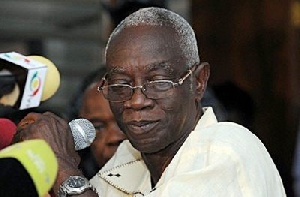Dr. Afari-Gyan says he recommended Ghana’s perfect electoral system to Nigeria during his time as head of a team of experts assembled to review Nigeria’s electoral process.
He made the revelation on Day 44 of the hearing of Ghana’s presidential election petition on Monday.
Dr. Afari-Gyan, witness for the Electoral Commission (EC) was confronted by the Petitioners' Lead Counsel Philip Addison with some of the recommendations he, Dr Afari-Gyan made to Nigeria’s Independent National Electoral Commission (INEC) as chair of a five-member independent international electoral assessment team. The team was put together by the UK and US diplomatic missions on the request of the President of Nigeria in 2011.
Addison sought to suggest that the EC chair made sweeping recommendations for electoral reforms in Nigeria and yet failed to execute similar recommendations that could enhance Ghana's electoral system.
One after the other, he read out the recommendations and questioned the EC chair whether those recommendations were not applicable to Ghana.
"Given the severe lack of confidence in the INEC leadership, and INEC’s perceived partiality in favour of the incumbent, the President/Executive should reconstitute the INEC Chair and Board based on a broad and inclusive consultation process. While such consultation is not currently required by law, it is not prohibited, and could significantly contribute to establishing confidence in INEC," Addison read out the first of the recommendations
He then asked the witness if he would give this same recommendations to Ghana.
Dr Afari-Gyan replied: “we have a very good, transparent, firm and tested electoral system”. He said there are many countries who would like to emulate Ghana’s system.
Addison read out another recommendation:
“INEC should be transparent in its work, by providing full information to election stakeholders in easily accessible formats. INEC should also establish standing mechanisms for sharing information and consulting with political parties and civil society at federal and lower levels. In addition INEC should undertake open, timely and efficient accreditation of election observers, and allow observers access to all stages of the electoral process”.
Dr. Afari-Gyan was questioned if Ghana’s process was transparent.
He replied that this recommendation has always been done in Ghana. He explained there are places where political party agents do not know where the printing of ballot papers were done or the calculation used in printing ballots. Agents are also not allowed during registration exercises, he assessed.
He said the hearing of the Election Petition attested to how verifiable Ghana’s electoral process was.
That happenings in Bubuashie and other constituencies could be re-visited as shown in the hearing was a good example for many countries to emulate, the E.C boss said.
Another recommendation read out said:
“A major area of concern has been a lack of transparency and verifiability in the results process. The counting of votes, and the transmission and tabulation of results must be transparent and conducted in strict compliance with the electoral law. In particular, results of each polling station should be announced and preferably displayed at the polling station, as well as at all the other points of collation.
Copies of polling station results should be given to party agents and all other persons entitled by law to receive them. For purposes of greater transparency a copy of the results at each counting or collation point could be made available to domestic observers present. All total results announced should be accompanied with a breakdown of the composite units.”
Afari-Gyan then said the recommendations were literally recommending Ghana to Nigeria.
Philip Addison accused the E.C of not providing collation sheets to the petitioners after they requested for it.
E.C explained that his recommendation was not to give observers or agents copies of sheets, but rather results which are summary of what was on the collation sheet.
Click to view details



General News of Monday, 15 July 2013
Source: Joy Online

















